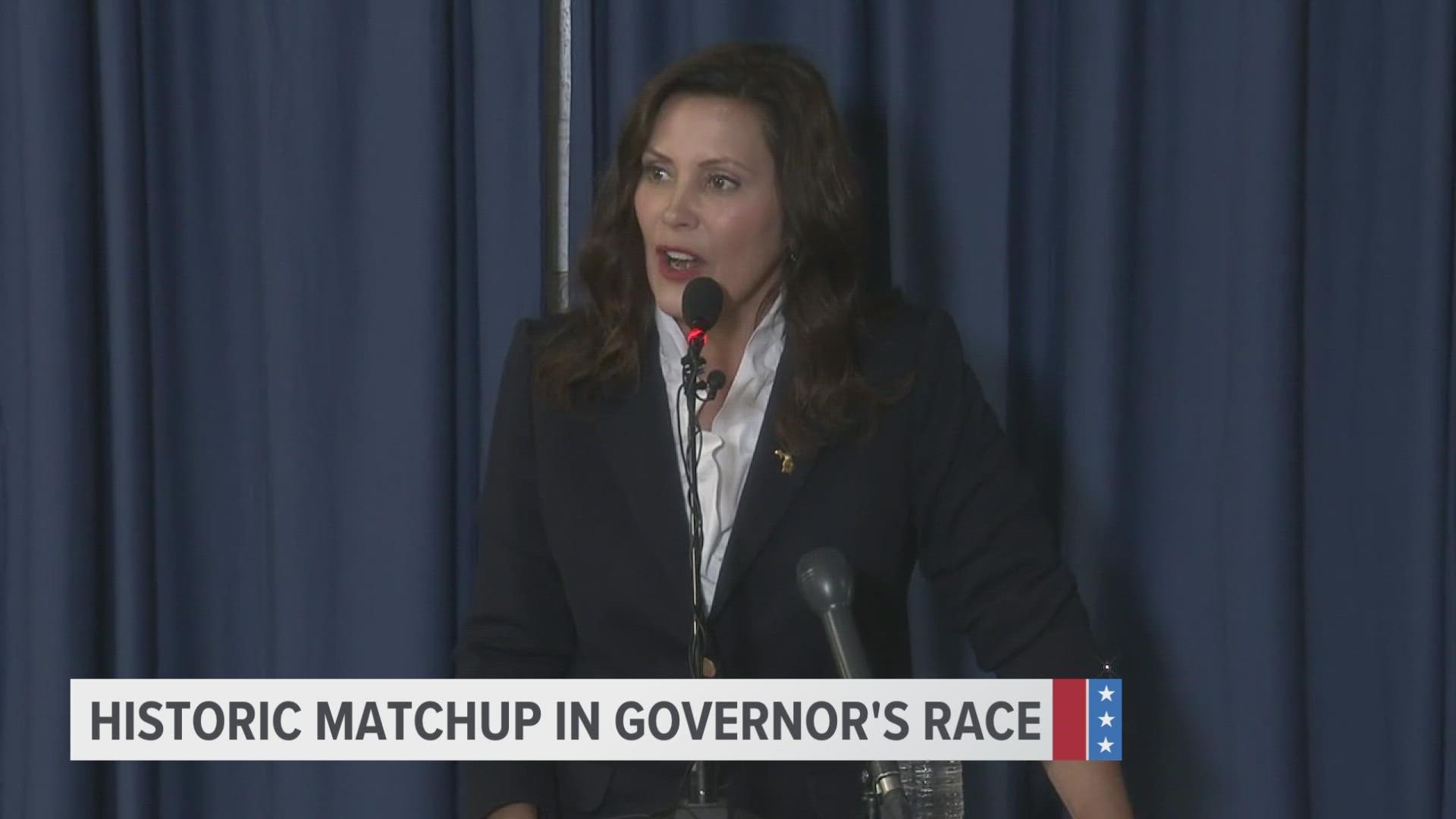MICHIGAN, USA — Tudor Dixon’s primary win late Tuesday evening sets the stage for a first-of-its-kind matchup: the first all-female gubernatorial race in Michigan election history.
“Generally speaking, most polls show that the election is going to be competitive,” Whitt Kilburn, an associate professor at Grand Valley State University and political science expert said via Zoom Wednesday, reacting to Dixon’s victory.
“Given some of the very high profile endorsements that came in for Tudor Dixon's candidacy, I think that signals that the party is increasingly unifying,” he suggested.
Collecting upward of 40% of the vote, the republican businesswoman edged out her rivals by nearly two-to-one in Tuesday’s vote.
Kevin Rinke attained a second place finish, receiving just over 20% of the returns that had been processed as of Wednesday morning.
Similarly, incumbent Governor Whitmer’s popularity, Kilburn said, would likely prove a force for her opponent to reckon with.
A July statewide survey conducted by the Glengariff Group showed 55% of voters approved of Whitmer’s performance on the job.
The survey also tested a theoretical matchup between Whitmer and Dixon.
Whitmer received 50.7% to Dixon’s 40.3% of votes in the hypothetical contest.
“Whitmer is a relatively popular governor in historical terms,” Kilburn noted. “But of course, also one that among Republicans is a very polarizing figure.”
Yet, candidates aside, a host of major external issues may also likely have an outsized say when it comes to who’s in the governor’s office next year.
Kilburn says one of the hot button issues in November will be access to abortion.
“Some of the national issues that spanned beyond Michigan, what role are these issues are going to have in the election,” he questioned. “Of course, access to abortion has been one of these issues that we've already seen playing out in some of the primaries. This issue itself, I think, is one that will probably have some sort of an effect on the election in terms of mobilizing supporters or opponents.”
Kansas residents, for example, overwhelmingly voted down a proposed alteration to the state constitution, one that would have effectively enable lawmakers to strip abortion protections from the books.
It proved an exercise, Kilburn said, in the level of influence polarizing issues inject into the larger dialogue, ultimately energizing activists on either side.
Dixon’s near two-to-one finish may also show the once-fractured party was, at this stage in the cycle, definitively in the process of healing old wounds and consolidating support between various wings.
“There are always intra-party fights,” Kilburn said. “I think, perhaps this year, it might seem like these contests for control of the direction of the parties might seem to be especially tense, or it might seem as if there's much more at stake within the parties. But I think it's important to keep in mind that these kinds of intra-party fights are a continual feature of our party and electoral system.”
“And what we typically see is that while there is some evidence that challenging primaries in which there's a great deal of competition within the party over who the nominee will be, there is some evidence that perhaps weakens the candidate going into the fall, but only in the extent to which perhaps it means that resources have been expended or perhaps it's just a distraction from the party in terms of developing its electoral strategy for the fall. I think, in this case, however, given the attention that's going to be focused on Michigan, I don't expect that to be as much of an issue as ordinarily it might be.”
Dixon, he said, would still need to build upon the support she had already garnered as of Tuesday evening’s victory, likely with an olive branch to both right-leaning independents and republican moderates.
“That's what I think we'll be looking for,” he said, betting on a dynamic, energizing November at the ballot box.
Polls showed Friday’s formal endorsement from former President Donald Trump, however, may have played out in Dixon’s favor.
Kilburn noted several parallels between the gubernatorial race and US Representative Peter Meijer’s primary loss to another Trump-endorsed candidate: John Gibbs.
“On the one hand, obviously, you can't discount too much Trump's role here and endorsing Gibbs,” he said. “I think that it's perhaps a little difficult to conclude positively, that this signals that the Trump-supporting wing of the Republican Party is in its ascendancy and is perhaps the one that is going to be increasingly successful and charting the future of the party.”
“I think what needs to be appreciated is how different the district looked in which Meijer competed. Roughly half of the district was not previously part of it… a big swath of voters had no real history of interacting with them as a congressman. So I think that's an another important factor. But I think it's too soon to see to what extent this really means that Trump's endorsement had a clear effect and was decisive, especially given that in some of the state races and some of the State Representative races, his endorsements didn't pan out.”
►Make it easy to keep up to date with more stories like this. Download the 13 ON YOUR SIDE app now.
Have a news tip? Email news@13onyourside.com, visit our Facebook page or Twitter. Subscribe to our YouTube channel.

